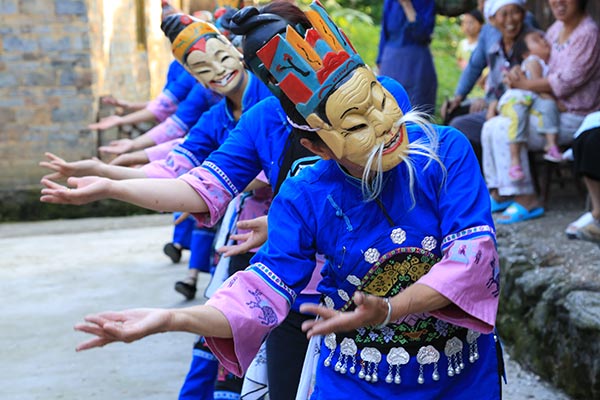Folk traditions still matter in Guizhou's villages
Updated: 2016-07-12 08:17
By
Satarupa Bhattacharjya and Dong Xianwu
(China Daily)
|
||||||||
 |
|
The Nuo opera is among folk traditions that were once very popular in Guizhou province. [Photo by Yang Jun/China Daily] |
In a remote village of the county, an intense scene unfolds as mask-wearing performers of the Nuo opera launch into action. The popular art form mixes storytelling, chanting, dancing, singing and stunts, and an act can go on for days and nights depending on the occasion.
"Families invite the performers after a birth or death or to have their wishes fulfilled through prayers," says Hou Tianwen, who pierces his head with blades as part of the opera.
The 43-year-old man has been performing the trick for the past decade but has yet to find an apprentice, mostly because the younger generations aren't as interested.
Each member of Hou's ensemble charges up to 400 yuan for a 24-hour show, he says. Some villages view the opera only as entertainment.
Nuo's key feature is a set of 24 wooden masks that represent the many gods of the Tujia people. Drums, gongs and horns provide other dramatic effects during shows.
The opera has been declared an intangible heritage by the central government.
Another tradition that will likely fade in the coming years unless protected is a style of high-pitched singing passed down generations.
Standing in the grounds of Ban Shang Middle School, which is located in a semi-urban area of the county, 49-year-old Tujia musician Wang Bo sings a song that was once meant to chase away from the villages straying wild animals. Wang's troupe of mostly female members in colorful clothing offers the chorus.
Among Wang's youngest disciples is Li Shanshan, 14, who likes Western rock and Chinese pop, and says she sings Tujia songs as a hobby. Most of her peers don't.
"Schools can help better safeguard our culture," says Wang, who has appeared on national television promoting the folk songs.
Dong Xianwu contributed to this story.
Related:
Peking Opera film Farewell, My Concubine shines in Tokyo
Portraying the Long March in a new light
- Philippine, Japan coast guards to hold exercise off Manila Bay
- Dozens more arrests in Louisiana after leaders warn against protest violence
- South China Sea Issue ABC
- South China Sea Issue ABC: Why the Philippines' unilateral initiation of arbitration is against international law?
- EU: Strenghten partnerships to stop economic woes
- Fresh killings in Indian-controlled Kashmir clashes raise death toll to 21

 Gettinig to know South China Sea Issue
Gettinig to know South China Sea Issue
 Ronaldo-less Portugal wins Euro 2016 title
Ronaldo-less Portugal wins Euro 2016 title
 Chinese navy fleet joins RIMPAC 2016 open day
Chinese navy fleet joins RIMPAC 2016 open day
 Staying cool at the zoo amid Shanghai heat wave
Staying cool at the zoo amid Shanghai heat wave
 Tibet through the lens of China Daily reporter
Tibet through the lens of China Daily reporter
 On the front lines of the flood battle in China
On the front lines of the flood battle in China
 Griezmann scores twice to lift France into Euro final
Griezmann scores twice to lift France into Euro final
 Life goes on in flooded Wuhan
Life goes on in flooded Wuhan
Most Viewed
Editor's Picks

|

|

|

|

|

|
Today's Top News
Ministry slams US-Korean THAAD deployment
Two police officers shot at protest in Dallas
Abe's blame game reveals his policies failing to get results
Ending wildlife trafficking must be policy priority in Asia
Effects of supply-side reform take time to be seen
Chinese State Councilor Yang Jiechi to meet Kerry
Chinese stocks surge on back of MSCI rumors
Liang avoids jail in shooting death
US Weekly

|

|







